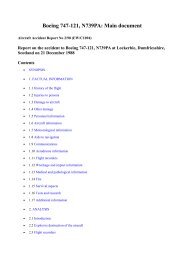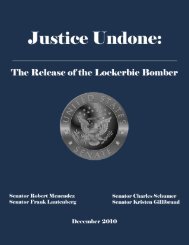REPORT OF THE - Archives - Syracuse University
REPORT OF THE - Archives - Syracuse University
REPORT OF THE - Archives - Syracuse University
Create successful ePaper yourself
Turn your PDF publications into a flip-book with our unique Google optimized e-Paper software.
airports. They believe it virtually impossible to isolate the suicide bomber or the innocent<br />
dupe who unknowingly carries a bomb aboard a plane.<br />
The West Germans also believe language problems may prevent some passengers from<br />
fully understanding the questions put to them. They prefer to educate passengers not to<br />
accept packages or to leave their bags unattended. They further question the<br />
qualifications of the private firms or airline personnel conducting the screening for U.S.<br />
carriers, in comparison to the West German police assigned the task under German law.<br />
Rather than putting so much effort into finding the dupe or the suicide bomber, the West<br />
Germans rely above all on baggage reconciliation to catch the bag planted by the "noshow"<br />
terrorist unwilling to die for the cause.<br />
The FAA, on the other hand, is reluctant to yield control of security to foreign<br />
organizations whose screeners may not have undergone satisfactory background checks,<br />
whose security systems it has not been able to test or evaluate, and over whom FAA has<br />
no regulatory authority.<br />
As with foreign governments, U.S. airlines complain that FAA's screening requirements<br />
are unnecessarily burdensome and less effective than the carrier's own procedures. They<br />
argue that FAA's criteria for questioning selects too many people who pose no threat. The<br />
carriers contend the time spent on many such low risk passengers limits the attention that<br />
could be devoted to the higher risk ones.<br />
AIRPORT SECURITY RECOMMENDATIONS<br />
FAA Foreign Airport Assessment Program<br />
[FIGURE NOT INCLUDED]<br />
Source: FAA Office of Civil Aviation Security, International Security Briefing for the<br />
Commission, January 8, 1990<br />
The privately owned U.S. airlines are required to bear the costs of security, some of<br />
which are paid by other carriers' governments. This fosters complaints by U.S. airlines of<br />
a distinct financial disadvantage compared to their foreign competition. (It should be<br />
noted, however, that foreign carriers must pay for security when they land in U.S.<br />
airports.) U.S. carriers also complain that delays from FAA-required security procedures<br />
compound the competitive disadvantage.<br />
Arguing that terrorist attacks are directed against governments, not airlines, the U.S.<br />
carriers began pushing in 1986, through the Air Transport Association, for a greater U.S.<br />
Government role in aviation security as an alternative to placing the entire burden on the<br />
airlines.<br />
The U.S. carriers seek a system in which competitors who fly the same routes would be<br />
required to implement the same security procedures. While unable to provide the<br />
Commission with hard evidence, several U.S. carriers alleged that they are losing full fare<br />
business travelers who are unwilling to wait in the lengthy American carrier check-in<br />
lines, or to arrive at the airport two hours before takeoff, to clear screening. [Note 5] As<br />
Northwest Airlines' Thornton explained:<br />
[W]hen the vice president of international marketing for 3M is traveling every month or<br />
every week to Germany, he's already accepted that there is a certain risk associated with










